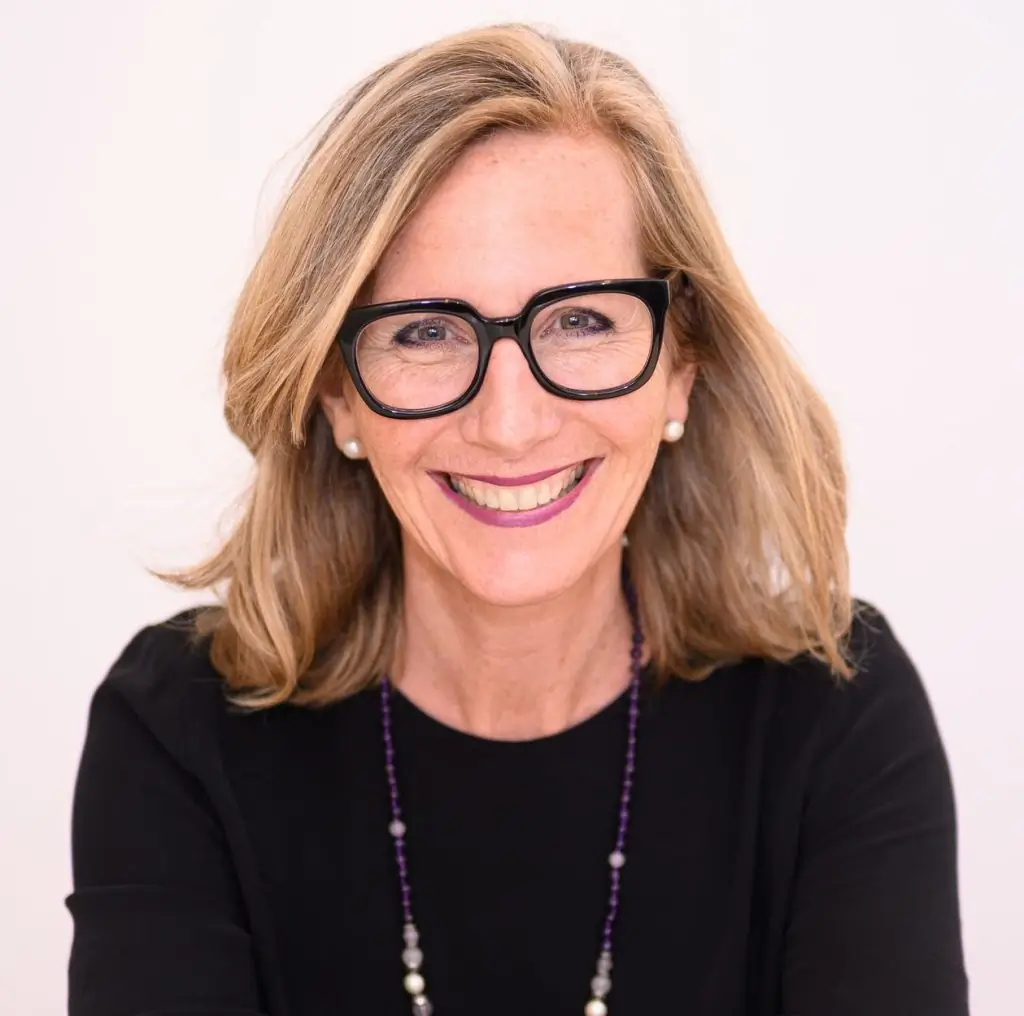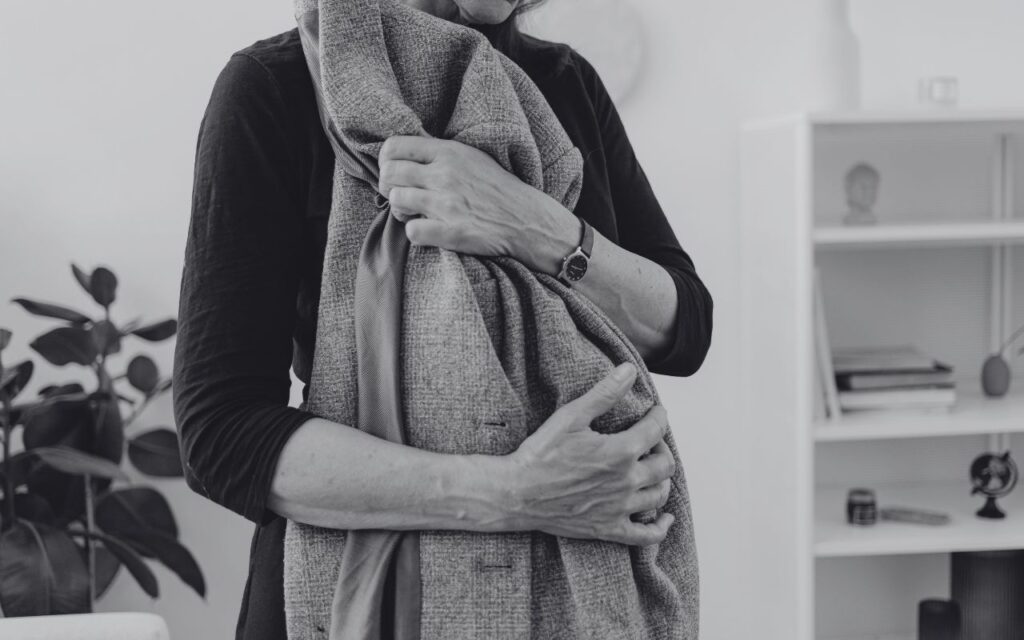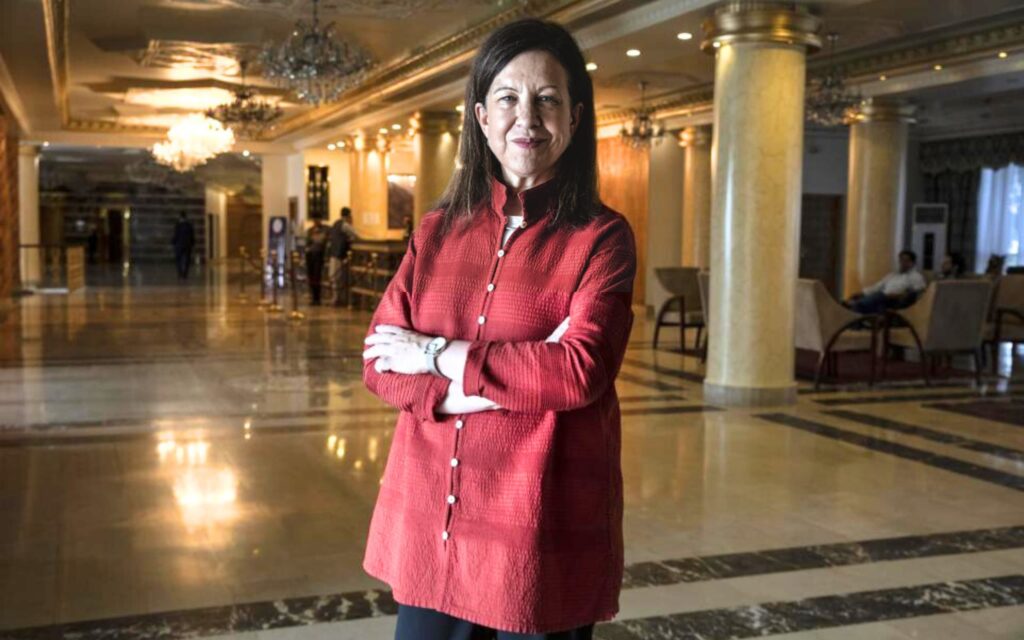
Jennifer Stewart: We’re going to take it back to the beginning. You grew up on a farm, surrounded by a lot of boys. What did that experience teach you?
Vicki Saunders: Just being a woman in the world is a whole thing, isn’t it? At a pretty early age, I became aware of this, ‘Everyone’s equal, we’re all the same, we expect the same of everyone, but could you just do all these extra tasks as the girl in the house?’. I was also a competitive athlete. Even as young as 12, I was the only girl on the boys’ soccer team, noticing how I was treated differently, and I wanted to do something about it. But every time I expressed my frustration, I got shut down quickly. And so, I just stopped pointing it out.
At a pretty early age, I became aware of this, ‘Everyone’s equal, we’re all the same, we expect the same of everyone, but could you just do all these extra tasks as the girl in the house?’.
Vicki Saunders
Jennifer Stewart: It’s pretty astute that you recognized that disparity as a young child.
Vicki Saunders: Yeah, this is obviously a long thread through my life. Tackling it is really hard, because it’s very hard to create change when you make people wrong. You have to find this navigational way around it. And as we start to see the systemic biases that are built in and you can’t tweak your way to the new world, it has to be radically redesigned, in my perspective.
Catherine Clark: Are you still facing that pushback that you got from pointing out that you have more chores? Now as a successful entrepreneur yourself?
Vicki Saunders: Yes, it’s still here. We just changed our name. We’re no longer SheEO. We are now called Coralus. It’s a movement from the individual, the CEO running her business, to a collective, because it takes a whole collective and an ecosystem to actually change the conditions for us to thrive. We started with this model of funding women entrepreneurs, because they were only getting less than 4 per cent of capital out in the marketplace, which is a global challenge. And so getting capital into women entrepreneurs, so we can see what their ideas are, so that we can actually see what we’re missing in the world. There are so many phenomenal ideas out there that just don’t get the support or funding.
We built a whole new capital model, and it’s a model of regenerative capital, where we do the 0 per cent interest loans, and then the entrepreneurs pay them back. And then the money rolls forward again. And our criteria is that we are funding women entrepreneurs, women and non-binary folk who are 51 per cent owners of their business at a certain stage, and they’re all working on the sustainable development goals. So those are our criteria. But the model that we’ve created could be done anywhere in the world. And a lot of people have been coming to us lately saying, “Can we replicate this?” And I’m like, absolutely. But people couldn’t hear us when we were called SheEO. Because they’d be like, “Oh, it’s a thing for women” and then shut down. Really, when we changed our name, all of a sudden, people are like, ‘Oh, so that’s just the criteria. So oh, your model could be used by other people, because it’s a really fantastic model.’ And so people are coming to us now.
Catherine Clark: Did you ever consider not changing it just because that was so annoying?
Vicki Saunders: We’ve wanted to change our name for a while. I’ve talked all along about not wanting to level the playing field. You need to create a new field. I really do think our systems and structures are very broken. They’re just not working for us for the time that we’re in. And we wanted to expand to non-binary, so ‘she’ isn’t inclusive enough. Even the concept of CEO is kind of old world. It’s like one person at the top running a thing. Lots of people who were really excited about what we were doing felt like ‘I’m not actually an entrepreneur, do I belong here? Can I be in this community?’ So we needed to change our name anyway.
Jennifer Stewart: You spoke about the fact that there’s a lot of untapped ideas. Just out of curiosity, from your experience, do you find it’s more about the idea being novel or the entrepreneurs or the group of entrepreneurs that can drive that idea forward and bring it to market?
Vicki Saunders: It’s really both. I remember one of the ventures that we funded in the early days was called 21 Toys. And this was a person who recognized that we needed to experience a lot of the skills that we need for the 21st century, and you can’t just read a book and understand empathy. You have to actually get in there and play. Toys are the new textbooks. Cool idea. So she created a failure toy and an empathy toy. And she came into our community, the women selected her. And she was super early stage, and was mostly doing consulting at the time. And one of our activators was like, “I think that our bank could use this. This looks really interesting.” So she invited her to a retreat about the senior women at the bank. She used her influence to open the door. And then Alana BenAri from 21 Toys got a huge six-figure contract for three years to train 40,000 employees at BMO. That happened because someone in the community saw this and said, “This is really cool,” got in relationship with this person and then made it happen. Resources like entrepreneurs, influencers, and funders, they’re all in different ways communities, but in our community, they’re all in the same place. They can find each other, get in relationship, and then change the conditions for people to survive and thrive.
Catherine Clark: You’ve said that systems are broken. You say we need to think of new ways of doing things. What do you mean?
Vicki Saunders: I think that the problems that we’re facing in society, the challenges we have in front of us, have all evolved beyond the institutions that were originally set up to deal with them. There’s a common thing, especially in the climate change space, where someone will be like, “Well, that’s not our mandate.” But if you don’t change your mandate, there will be no civilization. We have a lot of entrenched mandates for another time and another place, and that’s not where we live anymore. Inequality is being caused every single day by the way that we’re running the economy.
I think that the problems that we’re facing in society, the challenges we have in front of us, have all evolved beyond the institutions that were originally set up to deal with them.
Vicki Saunders
Jennifer Stewart: How do you chip away at these institutions to impact change?
Vicki Saunders: I am not a person who believes that you can chip away at things and create change. I think we have to go build the new world. I look at these existing systems, and it’s a nightmare to get inside there and try and change things. Entrenched interests are even more entrenched than they used to be. When I started SheEO, 85 people had the same wealth as half the planet. And this year, five people have the same wealth as half the planet. The game is so rigged, the way that we’ve set up our structures is so rigged for people who are in the door to take more. I believe that our economic model is fundamentally flawed. It’s not serving us anymore, and we need to redesign our economy and our structures. We know in our hearts that a better world is possible. But we’re stuck in rules of a game that is harming us, and we need to change them.
Jennifer Stewart: I love your perspective of rather than looking for a license to get into these organizations to impact change from a VP or president or HR perspective, you’re just in your own corner building it. That’s amazing.
Catherine Clark: But I guess the issue is, you’re in your own corner building it. How do you get the rest of the world to actually get on board? There haven’t been a lot of quick transitions to new ways of running the world order and the global economy that have ended peacefully and happily. How do you make it happen?
Vicki Saunders: I’m not here to do everything. So part of the thing that we’ve done with our community is, there is a better way to get capital to those who have been pushed to the margins, women and non-binary folk, and Black women, Indigenous women, women of colour. Twelve per cent of our portfolio is Indigenous-led, which is unheard of globally, and 45 per cent of our capital goes to Black, Indigenous, and women of colour. So we’ve shown that it’s possible with a different model. We’re a demonstration project, a tiny group of 1,400 women across five countries who’ve done this, a small group, totally under-resourced, and shown that you can actually do this differently. And all of our capital that has been put in is rolling forward in this perpetual cycle of regenerative capital going forward. So we’re showing that that’s possible.
The whole community decides what the community wants, what they think is best. It’s collective intelligence, and then we decentralize all the decision-making and we fuse all these forms of capital together. So it’s not just money that the entrepreneurs get, but they get access and influence and people removing barriers, and hugs when you need it, because it’s tough being an entrepreneur.
So now what we’re doing is we’re inviting in other communities who would like to create their own economies within their communities to come and practice with us, because it’s a different way of being. You show up differently in this concept of sort of radical generosity and trust with each other. And I think in the early days the old way of thinking about this is how are you going to scale this? How are you going to solve it for the world? I’m not trying to do that. We’re demonstrating it’s possible with the people that I was most interested in helping. And others who are out there who would like to do this with their communities? Come on in, learn how to do this and see if it works for you.
Jennifer Stewart: The loan given to these companies is zero per cent interest. Are you in this to make any money, or is this a passion project for you?
Vicki Saunders: Yeah, we’re not here to make money. I was really interested in the fact that there are lots of other economic models that have existed in history. The one we have right now is just one. But we’re in this place where we think this is the only model, the only way you can do things. It’s almost like we’re incarcerated in this single way of being. In the potlatch, which lasted a long time in Indigenous culture, when someone accumulated too much, they would have a big party, and everything would go into a longhouse. And then, women would distribute all of that excess abundance to the community. It all got shared because one person being good at something doesn’t mean they deserve all the spoils. The conditions that are created for that person to do well, are from everyone’s contributions, so everybody benefits from it. I looked at that model and thought that was really interesting.
We’ve managed to keep ourselves alive as an organization in a bunch of different ways, but we’re not trying to make money. We don’t take anything from the entrepreneurs. That’s a model that we currently have in a way of thinking in the world, which is if I have money and I’m going to share it with anyone else, I should get something. What we’re getting from sharing our money in this community is actually businesses that are creating the conditions for us to thrive. They are creating solutions that we need in our communities to have more wellness, to care for each other more, to pay people living wages. We look at all of those spillover benefits beyond the financial as being just as important or more important.
Catherine Clark: You have really spent your professional life effectively pushing a rock up a hill. What’s motivated you? What is it that keeps you going?
Vicki Saunders: Ever since I was a little kid, I’ve felt like the world isn’t the way it should be. I think we can do so much better. And I didn’t know how to do that. And I felt quite alone for a long time witnessing these things. And everyone else was like, ‘Oh, this is just the way it is, go get the job, make the money, give it away.’ And I’m like, ‘That just doesn’t make any sense to me, I think we need to redesign this so that all the way along, we’re doing the right thing.’ And so I’ve just experimented for 30 years.
It’s obviously been an unbelievably challenging ride, full of joy and full of heartache. But what’s very, very rewarding for me at the moment, as hard as it still is, is that every day I’m in communication with entrepreneurs who have very bravely stepped out to do something totally impossible, countercultural, and non-habitual for people. And I get to talk to them and help them and share what I’ve learned. In many ways, I feel I’m healing myself because I didn’t have that person beside me in my early days, whispering in my ear, “You got this, we’re with you.” And to see this whole generation coming along who have thousands of women surrounding them, telling them they matter, it’s awesome. It’s just great.
Jennifer Stewart: Obviously every entrepreneurial journey is different and every business is different. If you could give one piece of advice to woman-identifying and non-binary entrepreneurs, what would that be?
Vicki Saunders: At this moment in time, given what’s going on in this wild world that we’re living in, my biggest piece of advice that I really hope people can receive, is to find the others and get into a community to do your work together. If you’re sitting isolated and alone and you have a narrative that you’re doing this all by yourself, it’s virtually impossible.
I really do think we’re sort of conditioned to think we have to do all this stuff on our own and know everything. and it just sets you way back. But the second you walk into a place that embraces you, you’ve got all these different assets that people have in abundance that they want to give.
I have so many connections. I have 29,000 people on LinkedIn who all owe me a favour, and I want to use those favours, but I can’t do them all myself. So ask me if you need a connection to somebody. And each person has something different like that. Get into a community. There’s lots of them out there.







